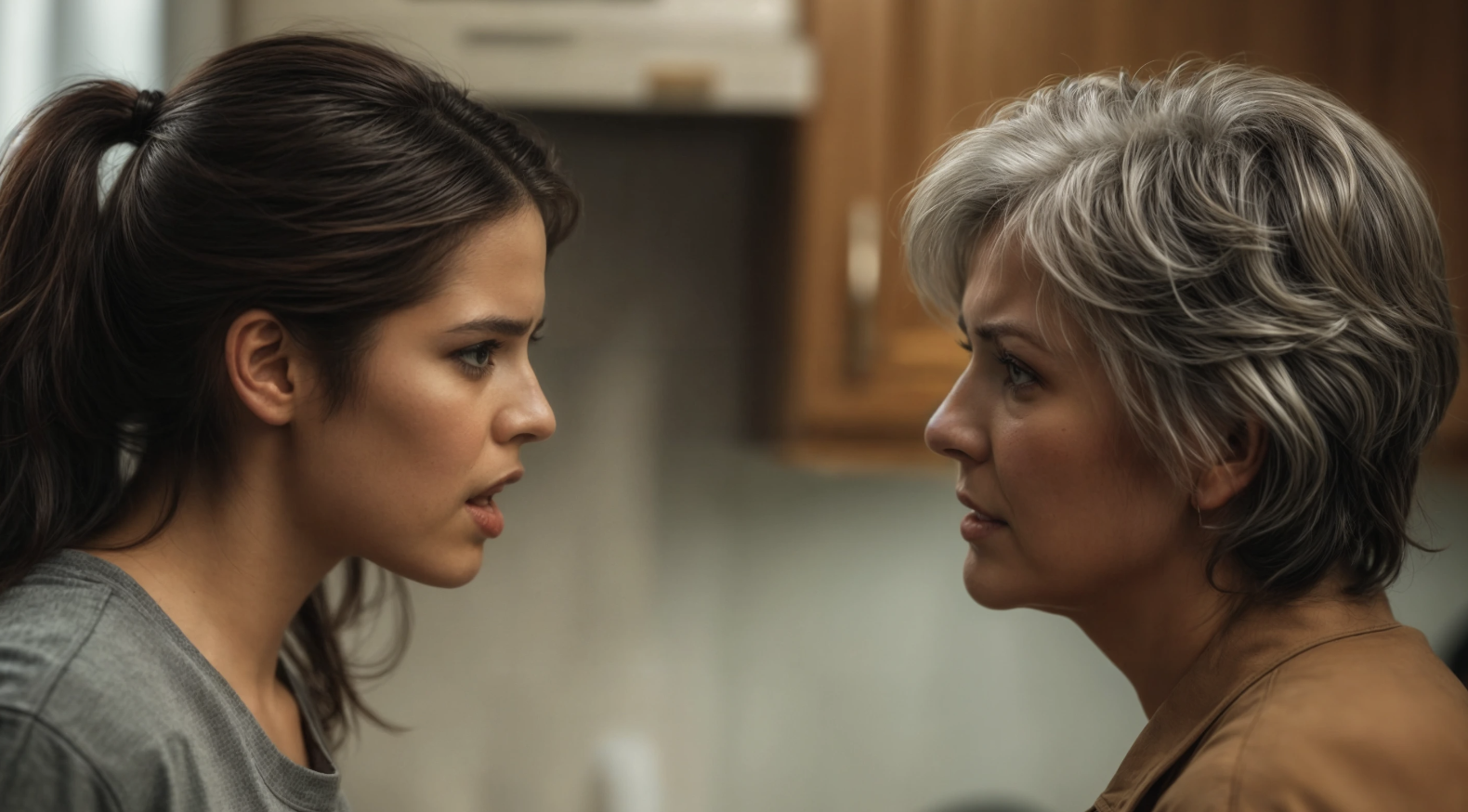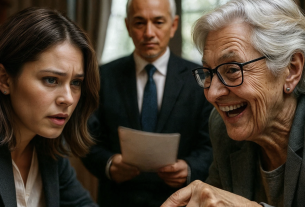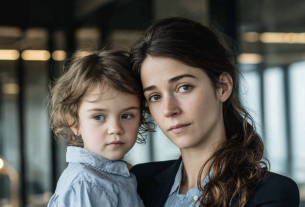— “The soup turned out very light, of course…” Irina Pavlovna’s voice was even, almost gentle, but the spoon with which she stirred the golden liquid in her son’s bowl moved with surgical precision, as if searching the broth for evidence of criminal negligence. “Valerochka could use something richer right now, with some bone. For strength.”
“Yes, it’s diet,” Sveta said, driving the knife hard into the firm flesh of a cucumber without turning her head. The knife went in with a dull crunch. She stood at the cutting board, her back to the table, and felt her mother-in-law’s gaze on the back of her head—heavy, probing, like an X-ray. She knew that look. It appeared every time Irina Pavlovna crossed their threshold. This wasn’t a visit; it was an inspection.
Valera, her forty-year-old husband, sat between them, his head obediently bowed over the bowl. He slurped spoon after spoon, performing his mother’s soup as something edible, but his silence was louder than any words. He didn’t say, “Mom, I like it; Sveta cooks well.” He simply ate, as if doing an unpleasant but necessary job, and with this silent compliance he betrayed her right here, in their own kitchen.
“And you didn’t steam his shirt, Svetočka,” Irina Pavlovna went on, shifting the object of her examination from the soup to her son. She extended her dry, ring-laden hand and, with maternal authority, smoothed the collar at Valera’s neck. He didn’t even flinch, only raised his chin slightly to give his mother better access to his body. “See, there are little creases left. The collar, Valerochka, needs to be steamed, not just ironed. Then it lies properly—like a man’s.”
Sveta brought the knife down on the board, slicing off the tip of the cucumber. Thud. Another blow. Thud. The rhythm of her chopping grew faster, angrier. She imagined the blade cutting through the thin skin of admonitions, biting into the juicy flesh of passive aggression, and splitting the spine of this endless humiliation. She worked, and she was judged. She tried, and she was lectured. All of it under the guise of care. The most poisonous, most suffocating form of control that exists in this world.
Satisfied with the collar check, Irina Pavlovna moved on to the main point. She pushed aside her untouched plate and folded her hands on the table, assuming the pose of a prosecutor about to read an indictment. Her eyes slid over the kitchen—over the perfectly clean cabinet fronts, the scrubbed stove—but lingered on the laundry basket waiting to be washed in the corner.
“I used to always pre-wash Valerochka’s socks by hand before putting them in the machine,” she said with nostalgic breathiness, as if recalling some long-gone golden age. “Especially the heels and toes. You go over them with laundry soap, give them a scrub with a brush—and then they’re like new. Snow-white. That way they last longer, don’t wear through.”
That was too much. This wasn’t about socks. It was a direct jab at the very heart of her competence as a woman—an insinuation that she was lazy, slovenly, and incapable of providing basic care for the man who had been “entrusted” to her.
Sveta stopped cutting. She looked at her husband. Valera lifted his eyes from the bowl to her. There was no support in his gaze. It held a meek, calf-like bewilderment. As if to say, What’s the big deal? Mom has a point. He nodded along with his mother, then turned on Sveta that very look she hated more than anything in the world—the look that silently asked, “Why can’t you just do what Mom says? Is it really that hard?”
At that moment something inside Sveta cracked with a deafening snap. Not just her patience. No—the entire load-bearing structure collapsed, the one that had held their fragile world together for years. She slowly, very carefully, set the knife down on the board. The sound of metal touching wood rang out in the sudden silence like a gunshot.
Sveta turned around slowly. She no longer looked at the table or the wall. Her gaze—straight and cold, like the steel of the knife she had just put down—was fixed directly on her mother-in-law. She ignored Valera as if he were empty space, a piece of furniture unworthy of attention. All her energy, the anger that had been building for months, years, was now focused in a single point.
“Irina Pavlovna, I’m going to tell you one thing now, and I want you to listen carefully,” she said. Her voice was surprisingly calm, without the slightest tremor, but in that quiet strength there was more menace than in any scream.
“What is there to tell? You’d better listen to me and remember how everything should be done properly for my Valerochka, otherwise—”
“I’m not a mommy to your forty-year-old son! And if you don’t like how my husband and I live, then how about I send him to live with you! And the two of you can reminisce together about how to wash his socks properly and make him meatballs!”
She delivered it evenly, without a single wasted emotion, cutting each word off like that cucumber a few minutes earlier. For a moment the kitchen grew so quiet you could hear the old refrigerator humming. Irina Pavlovna’s face began to change. The mask of the respectable, caring parent slipped, revealing the grimace of an offended proprietor. Her lips thinned, and a sharp, prickly spark flashed in her eyes.
“Who… who do you think you are?” she hissed, her voice breaking from feigned calm into shrill notes. “Look at her, Valerochka! Do you hear how she speaks to your mother? I gave you my son, entrusted my boy to you, and you… You ungrateful—!”
The words poured out in a stream honed over decades of manipulation. It was her signature move, her weapon of mass destruction—to trigger guilt in her son and make him rush to her defense. And it worked. As always.
Valera finally snapped out of his kitchen stupor. He jumped up so abruptly that the chair scraped back with a crash. His face, usually soft and spineless, flushed with anger.
“Sveta, are you out of your mind? Apologize to Mom. Now!” he barked. It was an order, not a request. He didn’t try to understand, didn’t seek a compromise. He simply broadcast his mother’s will. “You have no right to talk to her like that! You must obey her every word!”
But Sveta didn’t even look his way. Her gaze remained fixed on Irina Pavlovna, who was already working herself into a frenzy, wringing her hands in a theatrical gesture.
“I spent sleepless nights raising him, gave him everything, and now some—”
“Take him back,” Sveta cut in, without raising her voice.
The phrase, said so simply and matter-of-factly, struck them like a lash. They both fell silent and stared at her.
“What?” Valera asked, not believing his ears.
“You heard me.” Sveta turned her heavy gaze on him. There was no love and no pity in her eyes. Only a cold, scorched emptiness. “Since I’m so terrible, since I don’t know how to take care of your boy, then take him back. Right now. You’ve got plenty of room—you can go back to pre-washing his socks by hand and simmering him bone broth.”
At last the horror of what was happening began to dawn on Valera. This wasn’t just a scene. This was a revolt. An assault on the foundations of his universe, where a wife had to be obedient and Mom was always right.
“You… You’re kicking me out?! Of my own home?!” his voice broke with indignation.
Irina Pavlovna seized on the phrase like a life preserver.
“Do you hear that, son?! She’s throwing you out on the street! You, the man of the house! There—there’s her true nature!”
Sveta gave a crooked smirk. She let her eyes travel over her kitchen, her home—every tile and every pot bought with her money and scrubbed with her hands.
“The man of the house, is he?” She took a step toward the corridor leading to the bedroom. “Well then. Time for the man of the house to pack.”
She turned and, ignoring their shouting and wailing, strode firmly to the room. The discussion was over. Action was beginning.
Sveta entered the bedroom, and they, like a pair of hounds sensing the quarry changing tactics, trailed after her. Valera went first, his face still wearing a look of righteous anger mixed with complete incomprehension. Irina Pavlovna followed, ready to strike with words at any moment. But Sveta gave them no time to prepare. She didn’t simply open the wardrobe—she yanked the door so hard the old hinges squealed in protest.
Then came what they could never have expected. She didn’t carefully remove his shirts from the hangers. She plunged both hands deep into the closet and grabbed whatever she touched—expensive shirts, cheap T-shirts, stretched-out sweaters—and in one motion dumped the crumpled pile onto the floor. Hangers clattered onto the laminate in a metallic rain.
“What are you doing?! Those are my things!” Valera roared, stepping toward her.
Sveta ignored him. She darted out to the balcony and returned with two huge checkered holdalls, the kind you take to the market for potatoes. She tossed them to the floor with contempt beside the heap of clothes. The cheap polyester rustled as it spread out.
“Are you completely insane?” Now there was panic in Valera’s voice. He finally realized this wasn’t a joke, not a hysterical outburst. This was a methodical, cold process of removing him.
He tried to grab her arm to stop her, but Sveta jerked away with such force and looked at him with such an icy stare that he involuntarily stepped back. There was nothing in her eyes but disgust.
“Don’t touch me,” she ground out through her teeth.
Seeing her son lose control of the situation, Irina Pavlovna intervened.
“Valerochka, look what she’s become! A real beast! Everything we gave her, everything you did for her… and this is how she repays you! Throwing her husband’s things out like garbage!”
But her words no longer had any effect. They were just background noise, under which Sveta worked quickly and smoothly, like a porter at a train station. She began stuffing clothes into the bags without folding or sorting. Clean mixed with dirty, wrinkled with ironed. She opened a dresser drawer and started scooping out his underwear and socks, dumping them on top of the shirts.
Then her eyes fell on the bedside table. On it sat a game console, two controllers, and a stack of discs. His sanctuary. The spot where he spent his evenings, deafened by headphones, fleeing the real world. Sveta stepped over, ripped the cords from the outlet and the TV without a second thought. She didn’t bother to coil them. She just grabbed the whole tangle of wires, the console, and the controllers and tossed them into the second bag. The plastic thudded dully against the soft clothes.
“Don’t touch my console!” Valera shouted. It was a cry of despair. Losing shirts was unpleasant, but losing the console—that was a personal tragedy. “I paid for it!”
“You can pay again,” Sveta threw over her shoulder, heading to the bathroom.
A second later she returned holding his toothbrush, razor, a nearly full bottle of expensive cologne, and a jar of hair gel. All of it went into the same bag, right on top of the game discs. She moved like a cleanup mechanism, mercilessly removing any trace of his presence from her home.
Irina Pavlovna rushed about the room, not knowing what to grab. Her lamentations grew louder and more senseless. She appealed to conscience, to God, to common sense, but ran into a deaf wall.
Breathing heavily, Sveta zipped both bags. They were ugly, bulging; sleeves and T-shirt corners stuck out from the zippers. She grabbed the handles and, grunting with effort, dragged them toward the bedroom door. She passed the petrified husband and his mother, hauling along the remains of their shared life across the floor. Her face was unreadable. She didn’t look at them. She looked only ahead—at her goal, the front door.
Sveta dragged the bags down the narrow corridor, leaving dirty streaks on the laminate from the cheap plastic. Every inch was hard won; the bags snagged on doorframes, but she pulled them forward with the stubbornness of a draft horse. Valera and Irina Pavlovna followed, their voices merging into a single continuous hum of threats, reproaches, and bafflement. They still couldn’t believe this was really happening.
Reaching the front door, Sveta let go of the handles and, breathing hard, turned the key in the lock. The door swung open onto the landing. The dim light of the stairwell lamp picked out dusty railings and scuffed walls from the gloom.
“What are you doing? Have you lost your mind? Bring those things back in!” Valera ordered, still trying to play the role of head of the family.
Sveta looked at him as if he were an annoying fly. Without a word, she turned to the first bag and gave it a hard kick. The holdall lurched clumsily over the threshold and landed with a dull thud on the tiled floor of the landing. Then she grabbed the second, the heaviest, and with all her strength shoved it out after the first. It fell beside it; one of the controllers tumbled out through the half-open zipper.
Now there was nothing between her and Valera but the empty doorway. He stood there, stunned, looking from his things strewn in the stairwell to his wife, in whom he no longer recognized the quiet, compliant Sveta. “I said bring the things back!” he repeated, stepping toward her.
She didn’t answer. She simply planted both hands on his chest and pushed. Not hard, but firmly—the way you shove stuck furniture. Not expecting physical resistance, Valera staggered backward, tripped over his own bag, and collapsed awkwardly onto it. He ended up in the stairwell amid his junk, humiliated and bewildered.
One last task remained. Irina Pavlovna. She stood in the corridor, her face contorted with rage. Seeing how Sveta had treated her son, she switched to pure, undiluted venom.
“I’ll curse you! Do you hear me, you witch, I’ll curse you! You’ll rot alone in this house! No one will even look at you, you old wreck! He would have left you himself if he listened to me!”
Sveta stepped toward her. She moved slowly, with a frightening resolve. The mother-in-law, still spewing curses, instinctively began to back toward the exit.
“You’ll crawl back to us on your knees! Beg for forgiveness, and it’ll be too late! We’ll—”
She didn’t finish. When Irina Pavlovna, backing up, reached the threshold, Sveta did what she had wanted to do for the last ten years. She didn’t hit her. She shoved her—sharply, rudely, the sole of a house slipper into the soft spot just below the back. It wasn’t a hard blow that could cause pain, no. It was a humiliating, disdainful jab, the kind you use to chase away a yappy little dog.
With a squeal of surprise and humiliation, Irina Pavlovna lost her balance and, flailing her arms, tumbled out onto the landing, nearly falling onto her son.
Before they could recover or say another word, Sveta stepped back into the apartment. The door closed. It didn’t slam—no. It simply settled into place, shutting out the outside world. Click. Sveta turned the top lock. Click. Then the bottom.
She remained standing in the hallway, her back against the cold wood of the door. Muffled shouts and banging still came from the other side, but they already sounded dull and distant, as if from another world. The air in the apartment was thick and stale; it still rang with their screams, but under that ringing there was already an overwhelming, unfamiliar silence. Sveta exhaled slowly. She didn’t think about tomorrow. She felt neither joy nor sorrow. Only a vast, all-consuming sense of space opening up. She stood in the middle of her hallway. In her apartment. Alone…



